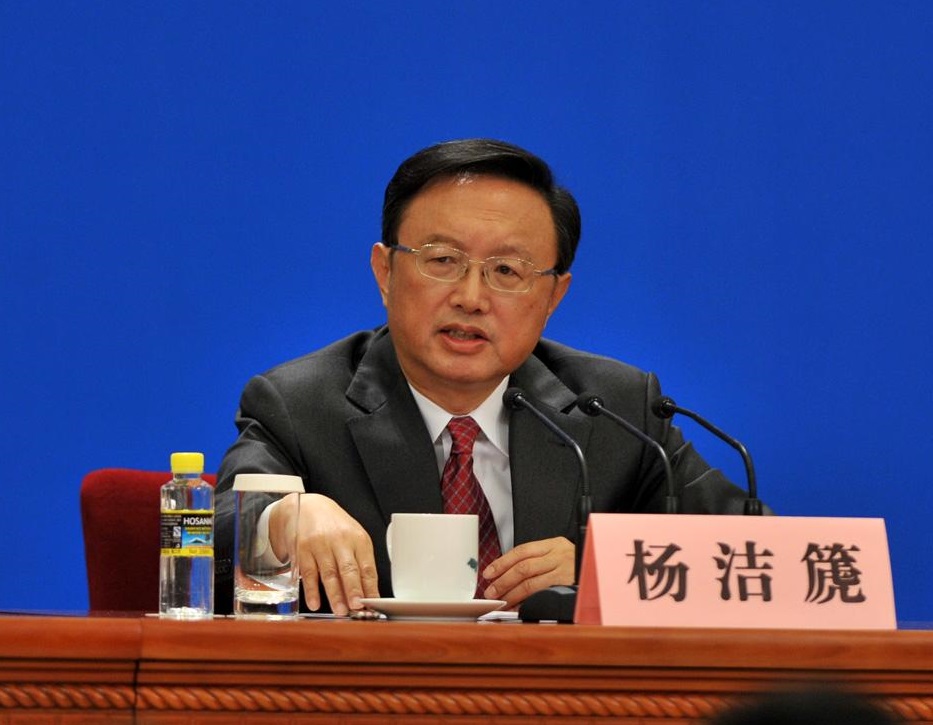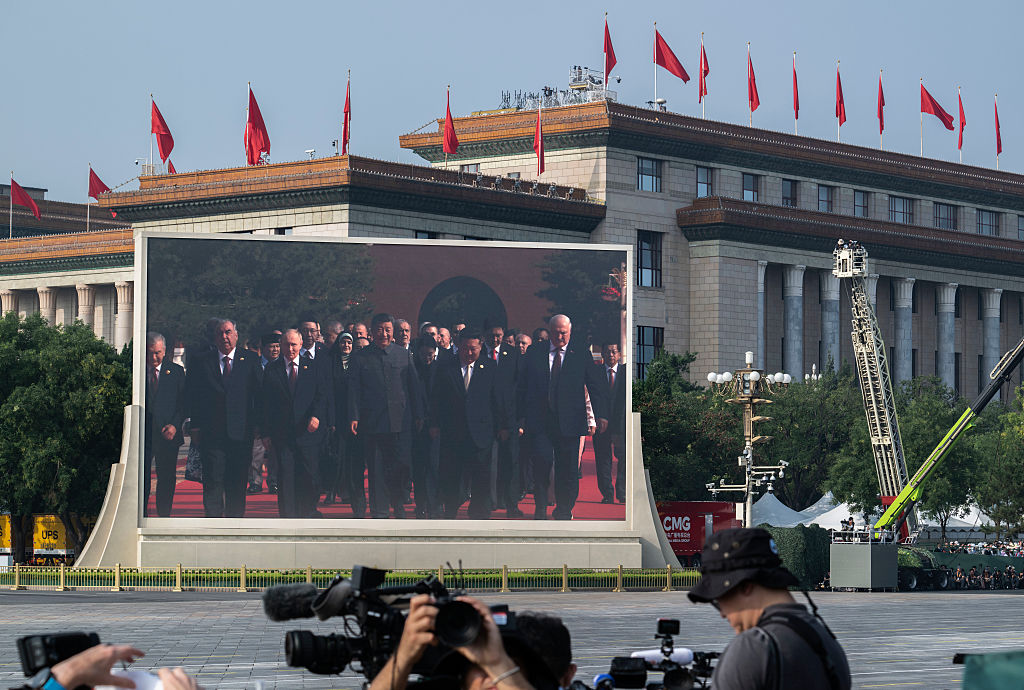
Yang Jiechi: Xi Jinping’s Top Diplomat Back in His Element
Yang Jiechi: Xi Jinping’s Top Diplomat Back in His Element
In the new leadership line-up following the recent 19th Party Congress, Yang Jiechi (杨洁篪), deserves special attention as the new arbiter of China’s foreign affairs. His promotion to the Politburo, with the prospect of becoming Vice-Premier taking overall charge of foreign affairs across multiple portfolios, restores the top diplomat’s status to the level once enjoyed by his former mentor Qian Qichen (钱其琛). Yang also paved the way for a more dynamic and open public diplomacy that has been used to great effect, particularly by Xi Jinping.
Generational Takeover
As the first Foreign Minister born after the founding of the communist regime in 1949, Yang exemplifies China’s current diplomatic workforce. Before Yang’s time, China’s foreign affairs establishment had been staffed mostly by former revolutionaries and demobilized soldiers donning civilian clothes. Perhaps unsurprisingly, they had limited training, spoke bafflingly accented Mandarin (Putonghua), (much less foreign languages), and were excessively dependent on translated, and often filtered, information about the outside world. A typical example of this generation was the PRC’s first ambassador to the U.S., Chai Zemin (1916-2010), who used to turn many heads at suave functions, with his zany Shanxi accent and rough-hewn demeanor acquired from his early days as a guerrilla fighter.
In contrast, Yang has been one of the best-trained new-era diplomats in an increasingly professionalized diplomatic service. After completing primary education in 1963, he was admitted to the Shanghai Foreign Languages School (SFLS), one of only 11 such select schools in the country at the time. This not only afforded him early exposure to English, crucial in foreign-language acquisition, but paved the way for his subsequent diplomatic career. Although his formal education was interrupted by the Cultural Revolution when he worked at the Pujiang Electricity Meter Factory, he was lucky to be chosen, in 1972, as a trainee for the Ministry of Foreign Affairs (MFA). At the time the MFA was in dire need of English-speaking staff in the wake of President Nixon’s ground-breaking visit to China and the PRC’s admission to the UN.
The following year, Yang was sent to Britain for further education, along with a group of similar recruits, including Wang Guangya, who used to share a bunk bed with Yang at SFLS and later became Permanent Representative to the UN (2003-2008), Zhou Wenzhong, who was eventually appointed Ambassador to Washington (2005-2010), and Le Aimei, who later became Yang’s wife. Yang first attended Ealing College, then the University of Bath and finally the London School of Economics (LSE) before returning to Beijing in 1975. Later in his career as ambassador to the United States he also managed to obtain his PhD in history from Nanjing University through distance education.
“Tiger Yang”
On the strength of his excellent command of English, Yang was assigned to the MFA’s Translation Office, where he worked for over ten years on two occasions (1975-83 and 1987-90), interpreting for most of the Chinese leaders of the time, including Deng Xiaoping. This gave him a vantage point at a young age to observe top-level diplomacy and to befriend key players on the world stage. In 1977, for instance, 27-year-old Yang Jiechi had the opportunity to accompany George Bush Senior and his family on the latter’s tour of Tibet. He got on so well with the Bush family that they became his life-long friends, affectionately calling him “Tiger Yang”, after the Year of the Tiger when he was born. This augured well for his subsequent career.
Fixer of Sino-US relations
As it turned out, apart from three Beijing-based stints mainly covering North America and Oceania (1990-93, 1995-2000, and 2005-07) until becoming Foreign Minister in 2007, Yang was to be posted three times to Washington, first as Second Secretary in 1983-87, then as Minister in 1993-95, and ultimately as Ambassador in 2001-05. These postings provided good opportunities for honing his diplomatic skills and for developing numerous contacts in the host country. Such skills and contacts were frequently called upon during his long diplomatic career. They proved particularly useful at critical junctures of Sino-US relations, such as in April 2001, when a US EP-3 spy plane collided with a Chinese J-8 interceptor fighter jet over international waters off China’s southern coast.
The mid-air collision, occurring only three months after Yang commenced his ambassadorship in Washington, resulted in the death of the Chinese pilot and forced the U.S. plane to land on Hainan Island, with its 24-crew members detained by the Chinese authorities. Washington demanded the immediate release of the crew, but Beijing wanted a formal apology first. Washington refused to apologize, insisting it had done nothing wrong. The standoff became so intense that waves of public antagonism and nationalistic sentiments swept across China and parts of the United States.
An old-style diplomat, like Chai Zemin, would have done little more than repeating the government line, and invariably through an interpreter. But Yang was different. According to Chinese sources, in the days following the incident, he made multiple visits to the State Department and Congress to lobby key individuals and became a frequenter of the White House, then occupied by George W. Bush. He also appeared twice a day on U.S. television, giving China’s view of the incident. When speaking on CNN, for instance, he used the analogy of nuisance drivers causing havoc in a faraway neighborhood and hitting a local resident who happened to take a look outside their own house. Is it too much for the victim’s family, Yang quipped, to ask for an apology?
Chinese sources said that Yang’s efforts made a big difference to US public opinion. After his TV appearances, more than 50 percent of respondents to opinion polls favored a US apology to China, compared with less than 20 percent beforehand (Shandong Province MFA Office, May 14, 2010). Before long, President Bush and Ambassador to China Joseph Prueher grudgingly expressed sorrow, though not exactly apologizing, for the death of the Chinese pilot and for the US aircraft entering Chinese space uninvited. Taking this as the formal apology it had demanded, China soon released the U.S. crew. The much-feared escalation of the crisis was thus averted.
The yin Yang
Yang’s ability to cultivate friendly contacts is certainly helped by his amiable personality. People who have worked with him say he is very approachable and does not put on airs (bu bai jiazi; 不摆架子) (Sina Blog, September 25, 2010). If we use the traditional Chinese yin-yang dichotomy to categorize Chinese diplomats, with yin meaning affable, sensitive and engaging and yang meaning tough, doughty and blunt, Yang Jiechi certainly falls into the yin category. For an archetypal hero of this category, one cannot go past Zhou Enlai, the PRC’s first Premier-cum-Foreign Minister, renowned for his qinheli (亲和力; ability to charm and befriend).
For a well-known figure of the yang category, we need look no further than Zhou’s immediate successor, Marshall Chen Yi (1901-72), whose table-thumping vehemence and famed ability to stare down rivals with his distinctive bulging and glaring eyes were widely admired by the older generation of soldier-diplomats. A contemporary example of this category is Sha Zukang, China’s Ambassador for Disarmament (1995-97), also from Yang’s cohort of UK-educated trainees, nicknamed “China’s John Bolton” for his outspoken bluntness. Of course, most fall between these two archetypes, with a few able to cross boundaries according to the circumstances at the negotiation table. Former Foreign Minister Qiao Guanhua (1913-83) was reputed to be capable of optimising his blend of scholarly and soldierly qualities (nengwen nengwu; 能文能武) to grin merrily or rebuke angrily (xixiao numa; 嬉笑怒骂) as the occasion demanded.
Out of Character
In July 2010, perhaps as an instinctive response to emulate the past masters of diplomatic versatility, the normally affable and gracious Yang—then Foreign Minister—famously stormed out of an ASEAN forum in response to U.S. Secretary of State Hillary Clinton’s criticism of Beijing’s conduct in the South China Sea. While Qiao’s broad repertoire had won him admiration, Yang’s out-of-character performance did not impress the forum participants.
To be fair, Yang was under pressure to act tough, especially when nationalistic sentiments were allowed to run high during Hu Jintao’s hamstrung presidency, with the Foreign Ministry portrayed by belligerent elements as too weak against foreign aggressiveness. Yang thus found it necessary to show a tough and gritty side, though he usually did it more subtly than at the ASEAN forum. When confronting the press, he would sometimes make a joke of the fact that he was born a Tiger, hinting that he would resolutely safeguard China’s national interest like a tiger protecting its cub (CCP News, September 2007).
Soft Power With a Personal Touch
Posturing aside, Yang’s long-term exposure to the outside world and his superior command of English enabled him to feel the need to improve China’s international image more keenly than most of his fellow bureaucrats. As a result, during Yang’s tenure as Foreign Minister (2007-2013) Beijing began to promote its public diplomacy in a big way.
Veteran diplomats and distinguished scholars were enlisted to form the Public Diplomacy Advisory Panel and the second-track Public Diplomacy Association was also established. The high-profile publication Public Diplomacy Quarterly was launched, with Yang’s close associate, Ambassador Zhou Wenzhong (who attended Bath University and LSE with Yang), on its editorial board. The MFA’s public diplomacy unit was upgraded, with its name changed, first from Gongzhong (公众) to Gonggong Waijiaochu (公共外交处) and then to Gonggong Waijiao Bangongshi (公共外交办公室; Public Diplomacy Office) to reflect its expanded focus (MFA, December 26, 2012).
Yang also opened the Foreign Ministry’s doors to the public through such activities as Open Days and the Blue Room Forums.
The erstwhile bashful Yang also saw fit to utilize these occasions to flaunt his hobbies that happen to include key ingredients of China’s soft power: calligraphy, ping pong and Peking Opera (
Back in His Element?
If Yang had been out of his depth under Hu’s unassuming stewardship, the much stronger leadership of Xi Jinping may offer a chance for Yang to do what he does best.
Having now consolidated his power, Xi is vigorously pushing ahead with his mega-projects like the Belt and Road Initiative and “a new type of major power relations” (新型大国关系), a catchphrase reportedly coined by Yang with his brother Jiemian (杨洁勉), a noted strategic analyst. And who better to help Xi build such relations than Yang, having devoted almost his entire career to cultivating ties with the biggest power in the world. It is, therefore, no surprise that Yang took credit for the good rapport developed between Xi and Donald Trump at recent summits (SCMP, October 25).
Admittedly, Yang is not nearly as versatile as some of his predecessors, but a unique convergence of circumstances has enabled Yang to turn his weakness to good advantage. With Xi himself bonding well with Russian leader Vladimir Putin and Foreign Minister Wang Yi, Yang’s Japanese-speaking successor, working on Japan, Yang can afford to focus on his specialty in getting the US relationship right.
More importantly, Xi may do well to have his formidable strength (yang) complemented by Yang’s soft touch (yin). An empowered Yang may feel more comfortable displaying his congeniality, not just to endear himself to “the core leader of the new era”, but to help win over more international support for Xi’s grandiose China dream.


